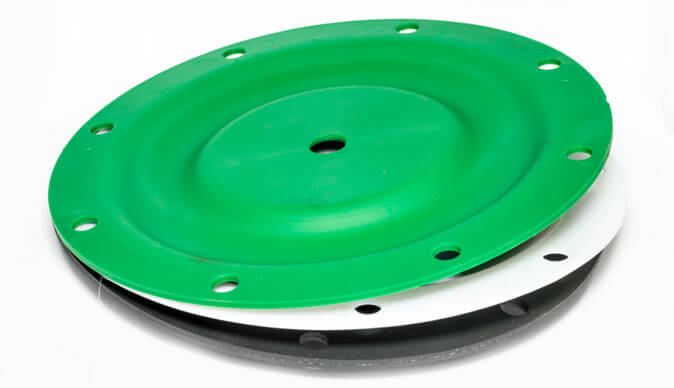Diaphragms are flexible, thin membranes or barriers used in a wide range of applications to separate two spaces or transmit forces.
They are made from various materials, including elastomers, rubber, metal, and fabric-reinforced materials. The main uses of diaphragms include:
- Pressure Regulation: Diaphragms are commonly used in pressure regulators and control valves to maintain consistent pressure levels within a system. They respond to changes in pressure by flexing, which helps to open or close the valve and control the flow of fluids or gases.
- Pumps: Diaphragm pumps use a flexible diaphragm to create pressure changes that move liquids or gases. When the diaphragm is actuated, it displaces the fluid, allowing it to be pumped from one chamber to another.
- Actuators: Diaphragm actuators are used in various control systems, such as in industrial automation, to convert pressure or fluid changes into mechanical motion or force. They are often used to control the opening and closing of valves or other mechanical components.
- Pressure Sensors: Diaphragms can be employed in pressure sensors to measure changes in pressure. When pressure is applied to one side of the diaphragm, it deforms, and this deformation can be measured to determine the pressure level.
- Medical Devices: Diaphragms are used in various medical devices, such as respiratory devices, pumps, and infusion systems. They help to control the flow of gases or fluids and provide accurate dosing.
- Automotive Applications: Diaphragms are used in automotive systems, such as in carburettors and fuel pumps, to regulate fuel flow and pressure.
- Valves: Diaphragm valves use a flexible diaphragm to control the flow of liquids or gases. When the diaphragm is compressed against a seat, it prevents flow, and when it is released, it allows flow to occur.
- Aerospace Applications: Diaphragms are utilized in aerospace systems, such as in pressure regulators and fluid control systems, to ensure precise pressure and flow control.
- Water Treatment: Diaphragms are used in various water treatment processes, such as in diaphragm pumps and chemical dosing systems, to handle and control the flow of fluids and chemicals.
- Industrial Applications: Diaphragms are found in numerous industrial applications, including in control systems, chemical processing equipment, dosing pumps, and fluid handling systems.
The flexible and versatile nature of diaphragms makes them an essential component in many devices and systems where accurate control, pressure regulation, and separation of fluids or gases are necessary.
Using diaphragms offers several benefits in various applications due to their unique characteristics and functionality. Some of the key benefits of using diaphragms include:
- Flexibility: Diaphragms are flexible, allowing them to deform and move in response to pressure or force changes. This flexibility enables them to adapt to different conditions and maintain accurate control over the system they are used in.
- Versatility: Diaphragms can be made from a wide range of materials, such as elastomers, rubber, metal, and fabric-reinforced materials. This versatility allows them to be used in diverse applications, from regulating pressure and flow to transmitting forces and separating different substances.
- Precise Control: Diaphragms are capable of providing precise control over pressure, flow, and force. They respond quickly to changes, making them suitable for applications that require accurate and rapid adjustments.
- No Leakage: Diaphragms create a reliable seal between two spaces, preventing leakage of fluids or gases. This feature is crucial in applications where maintaining a leak-free environment is essential for safety and efficiency.
- Low Maintenance: Diaphragms generally require minimal maintenance due to their simple design and fewer moving parts. They are less prone to wear and tear, contributing to the overall reliability of the system.
- Contamination Resistance: In some applications, diaphragms act as barriers between different substances, preventing contamination and ensuring purity of the materials being handled.
- Cost-Effectiveness: Diaphragms can often be manufactured at a relatively low cost compared to other types of components used for similar purposes. Their long service life and low maintenance needs also contribute to cost-effectiveness.
- Safety: Diaphragms play a crucial role in maintaining the safety of various systems. For example, in pressure regulators or relief valves, they ensure that pressure is controlled within safe limits, preventing overpressure situations.
- Reduced Friction: In some applications, diaphragms can reduce friction between moving parts, leading to smoother operation and less energy consumption.
- Environmental Compatibility: Depending on the material used, diaphragms can be designed to be environmentally compatible and suitable for use in various industries, including food and pharmaceutical applications.
- Shock and Vibration Absorption: Diaphragms can absorb and dampen shock and vibration in certain systems, protecting sensitive components from damage.
Overall, the benefits of using diaphragms make them a valuable component in a wide range of applications, including industrial, automotive, medical, aerospace, and environmental systems. Their ability to provide precise control, reliability, and safety makes them a preferred choice in many critical and demanding scenarios.


